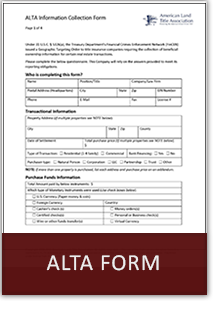Trusts are no longer considered a reportable “Legal Entity”; therefore, the requirements for submitting may be ignored.

On Nov 15, FinCEN issued updated Geographic Targeting Orders (GTOs)
for home purchases that do not have a lender or bank.
These special requirements apply if…
- the residence purchase price is more than $300,000
- the buyer is a legal entity, such as a corporation, partnership, or LLC
- the home is located within Los Angeles, San Diego, San Francisco, San Mateo, and Santa Clara counties
- Any portion of the purchase price is paid using currency, wire transfer, cashier’s check, certified check, traveler’s check, money order, personal check, or business check – this includes virtual currency
For such transactions, the person(s) responsible for the Legal Entity should be prepared with…
- the ALTA 2018 Information Collection Form
- government-issued
ID , such as his or her driver license or passport - taxpayer ID Number or EIN
Trusts are no longer considered a reportable “Legal Entity”; therefore, the requirements for submitting may be ignored until May 2019.
Escrow of the West facilitates communication between the buyer and title companies. To expedite your transaction, complete the ALTA Information Collection Form, provided on the Escrow Forms & Tools page for your convenience.
According to FinCEN, a “legal entity” is defined as “a corporation, limited liability company, partnership or other similar business entity, whether formed under the laws of a state, or of the United States or a foreign jurisdiction.”
The “beneficial owner” who must be identified is defined as “each individual who, directly or indirectly, owns 25% or more of the equity interests of the Legal Entity purchasing real property in the Covered Transaction.”
This definition tracks the Beneficial Ownership rule issued by FinCEN in 2016 for customer due diligence by covered financial institutions for new legal entity accounts by focusing on 25% or more ownership percentage, but it differs from the Beneficial Ownership rule by not including a “control” prong in its definition of a beneficial owner.



